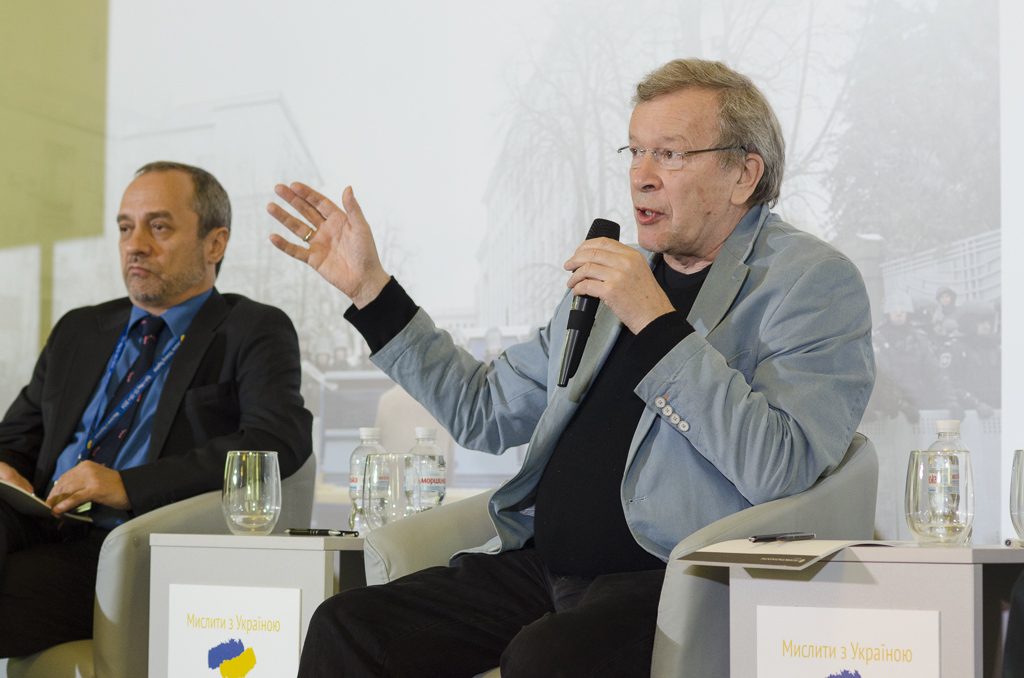Kyiv, May 18, 2014 – What is taking place today is not so much a seizure of parts of Ukraine and a demonstration of Russian resistance to the West, but a war of values. The main threat to the Western world, which the Maidan exposed, is the violation of human rights. These were the key findings of the panel “Do Rights Make Us Human?”, the first to be held at the conference “Ukraine: Thinking Together”.
“There is a previously unreported but ruthless war of values between East and West. We paid too little attention to it. But that’s exactly what lies behind this crisis. It is a conflict between two ways of life, and it is more horrible than the Cold War, which involved people, but not ideologies,” said Russian writer Viktor Erofeyev.
According to Russian journalist and human rights activist Alexander Podrabinek, “Of the many problems that led to the current situation, there are two of special importance for Ukraine and Russia that concern human-rights violations. These are infringements on freedom of speech and the inability of the people to elect candidates to positions of power in a transparent way. Propaganda is the weapon of totalitarianism and the path to bloodshed, while information is the weapon of freedom. Therefore, it is necessary to resist propaganda with information that does not cloud our minds.” He also added that Western sanctions against Russia should have been introduced much earlier, when the process of curtailing freedom of speech began in Russia.
Ukrainian-Jewish historian Igor Shchupak observed that one of the most alarming results of Russian propaganda is the “substitution of concepts”, which is particularly well developed in eastern Ukraine. “The greatest achievement of Russian propaganda,” said Shchupak, “is that it has managed to blur concepts, not only historical ones, such as Nazism and fascism (people do not see the difference between them), but also basic notions of freedom or ethnicity. As a result, we have the emergence of people of Luhansk and Donetsk nationality. That’s nonsense. This also applies to “the people of Crimea”. It’s said that the Crimean people is made up of Russians who voted against the “Banderivtsy” [a reference to followers of a west Ukrainian far-right politician during the Second World War, eds.]. When concepts are blurred, an understanding of what is happening in the world disappears, and people do not want, are even afraid to think about the choices they make.”
Analyzing the nature of the crisis and possible ways out of it, the panelists stressed the importance of looking at the situation as a whole and not focusing solely on attempts to oppose Putin’s aggression. Ivan Krastev, chairman of the Centre of Liberal Strategies in Sofia, noted: “After the annexation of the Crimea, a new geopolitical situation emerged; more and more people became willing to turn a blind eye to human rights. One can always find arguments to justify the situation in certain regions of Ukraine: money comes from Russia, there are “green men” present [a reference to the heavily armed masked men in unmarked uniforms who seized key objects of interest in Crimea and eastern Ukraine, eds.]. Of course, it’s all true. But if we look only at the special operations in the east, we lose healthy sense of empathy and mutual understanding. It’s not just a matter of geopolitics. It is a war of values now.”
The speakers acknowledged that Ukraine has set an example for a revolution with dignity. However, they warned that a failure to adhere to those values could jeopardize everything that has been achieved. As Leon Wieseltier, literary editor of the magazine The New Republic, summarized in his opening remarks prior to the panel, “Now, we have to take into account the importance of morality in geopolitics. Now, we have to reckon with the importance of morality in geopolitics. In the long term, people’s attitudes carry more weight than the existence of regimes.”

